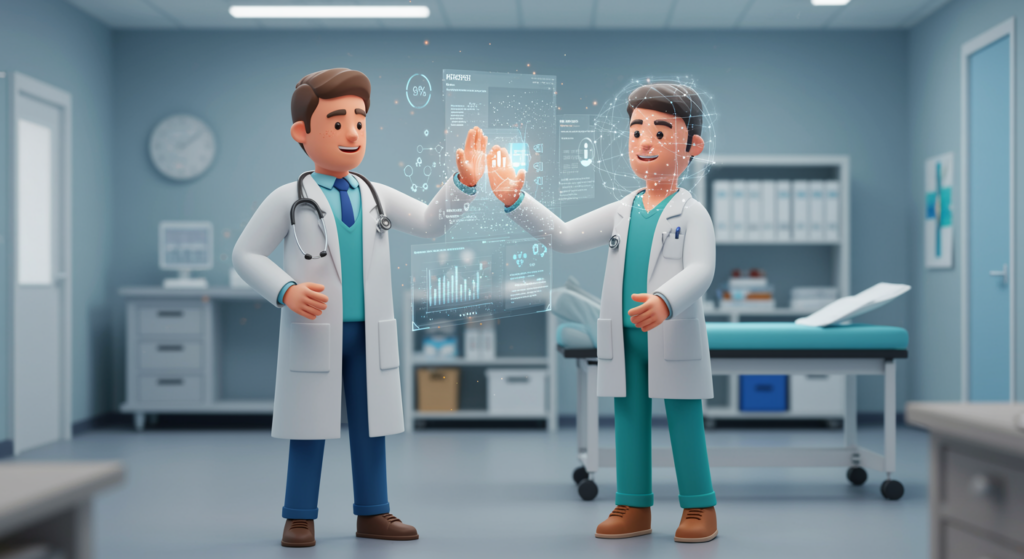
AI in Healthcare: Upgrading Doctors Without Replacement
The Dawn of AI in Healthcare
AI in healthcare is reshaping how doctors work, turning complex data into actionable insights while keeping human touch at the core. Imagine a world where routine tasks no longer bog down clinicians, allowing them to focus on what matters most: connecting with patients. This evolution isn’t about swapping out professionals; it’s about equipping them with tools that amplify their expertise, reduce errors, and create a more efficient system overall.
From analyzing vast datasets to predicting potential health risks, AI acts as a reliable partner, not a rival. Have you ever wondered how technology could make your doctor’s visit faster and more accurate? That’s the promise of AI in healthcare, where machines handle the heavy lifting, letting human judgment shine.
How AI is Revolutionizing Healthcare Delivery
Enhancing Diagnostic Accuracy with AI
One of the standout benefits of AI in healthcare is its ability to sift through mountains of medical data, like scans and lab results, with incredible speed and precision. For instance, AI algorithms can spot early signs of heart disease or lung cancer in images that might take hours for a human to review, often catching details that eyes alone might miss. This means doctors can make quicker, more informed decisions, potentially saving lives through earlier interventions.
According to a study from the National Institute for Health and Care Research, AI-driven tools are improving diagnostic accuracy by up to 20% in certain areas, such as radiology[1]. But it’s not just about the tech—it’s about how it empowers doctors to build better treatment strategies, minimizing risks and enhancing patient trust.
Personalizing Treatment and Predicting Outcomes
AI in healthcare is making precision medicine a reality by tailoring treatments to individual needs, considering everything from genetics to daily habits. Think about a patient with chronic conditions like diabetes; AI can predict flare-ups and suggest customized plans, helping doctors deliver care that’s truly one-of-a-kind. This approach not only boosts effectiveness but also reduces trial-and-error, leading to faster recoveries.
For example, in cancer care, machine learning models analyze patterns to forecast how a tumor might respond to therapy, giving clinicians a head start on the best options. As you consider your own health journey, wouldn’t it be reassuring to know that AI in healthcare is working behind the scenes to make treatments more predictive and personal?
Optimizing Hospital Operations
Hospitals are leveraging AI in healthcare to streamline operations, from forecasting patient inflows to managing staff schedules efficiently. This technology can cut down emergency room wait times by predicting busy periods, ensuring resources are where they’re needed most. By automating mundane tasks like paperwork, doctors gain more time for direct patient interactions, which can significantly improve satisfaction and care quality.
A real-world scenario: A busy clinic uses AI to optimize bed allocation, preventing bottlenecks and reducing stress on healthcare teams. It’s these practical applications that highlight how AI in healthcare isn’t just innovative—it’s essential for modern, efficient systems.
Enabling Preventive Care and Health Monitoring
With AI in healthcare, preventive measures are becoming proactive rather than reactive. AI systems monitor patient data in real time, flagging risks for conditions like hypertension before they escalate, which allows for timely interventions. This shift could dramatically lower healthcare costs and improve long-term outcomes by catching issues early.
Picture wearable devices that use AI to track vital signs and alert doctors to anomalies—it’s like having a personal health guardian. Through tools like automated screenings, AI in healthcare frees up professionals to engage more deeply with patients, fostering stronger relationships and better overall wellness.
Practical Use Cases of AI in Healthcare
- Medical Imaging: AI algorithms quickly interpret X-rays and MRIs, identifying issues with high accuracy and helping doctors diagnose faster than ever.
- Drug Discovery: In the race against diseases, AI in healthcare speeds up finding new drugs by predicting side effects and efficacy, shaving years off traditional processes.
- Virtual Health Assistants: Chatbots powered by AI handle appointment reminders and basic queries, making healthcare more accessible and efficient for everyone involved.
- Robotic Surgery: Surgeons rely on AI-enhanced robots for precise, minimally invasive procedures, leading to quicker recoveries and fewer complications.
- Data Management: AI organizes vast health datasets, uncovering insights that inform policies and personalize care, proving its value in everyday medical practice.
These examples show how AI in healthcare is already making a difference, blending technology with human insight for tangible results.
Why AI Won’t Replace Doctors: The Human-AI Synergy
While AI in healthcare handles data crunching with ease, it can’t replicate the empathy and nuanced understanding that doctors bring to the table. Patients often share that a compassionate conversation with their physician means more than any algorithm’s output. Instead, AI serves as a supportive tool, managing repetitive tasks so doctors can prioritize emotional support and ethical decision-making.
This partnership leads to benefits like heightened diagnostic accuracy and personalized care plans. For instance, AI might analyze trends, but it’s the doctor who interprets the context and builds trust—ensuring AI in healthcare enhances rather than eclipses human roles.
Key Benefits of AI-Augmented Healthcare
- Sharper accuracy in spotting and treating illnesses
- Quicker access to results and expert opinions
- Tailored treatments based on comprehensive data
- More quality time for doctors to connect with patients
- Efficient use of resources across the healthcare network
Overcoming Challenges in AI Integration
Adopting AI in healthcare comes with hurdles, such as protecting data privacy and eliminating biases in algorithms. Organizations are stepping up with strict regulations to keep patient information secure and ensure AI tools are fair and transparent. It’s all about building trust through responsible implementation, where technology serves people without compromising ethics.
Have you thought about how these challenges might affect your own medical experiences? By focusing on patient-centered solutions, the industry is paving the way for safer, more reliable AI in healthcare innovations.
A Glimpse Into the Future of AI in Healthcare
Near-Term Innovations in AI
- AI-powered virtual assistants for seamless telehealth and triage, making remote consultations more effective.
- Advanced precision in imaging to detect diseases early, giving doctors a critical edge in prevention.
- Automation of admin tasks to lighten workloads and let clinicians focus on core duties.
Mid-Term Developments
- Ambient intelligence systems in hospitals that monitor patients in real time, enhancing safety and response times.
- Widespread robotic therapies and personalized medicine, where AI in healthcare tailors treatments like never before.
Long-Term Possibilities
- Fully digital infrastructures connecting data for holistic care.
- Blending genomics with AI for comprehensive health insights.
- Digital twins that simulate outcomes, helping doctors choose the best paths forward in AI in healthcare.
How Doctors Are Embracing AI in Healthcare
Forward-thinking doctors are treating AI in healthcare as an ally, honing skills in data analysis and team collaboration to drive ethical tech use. Through ongoing training, they’re learning to scrutinize AI suggestions and integrate them into patient care seamlessly. This proactive approach ensures that technology supports, rather than supplants, the human element in medicine.
It’s inspiring to see professionals leading this charge—what steps could you take to stay informed on these changes?
Conclusion: Human + AI in Healthcare
The future shines brightest when AI in healthcare teams up with human expertise, creating a system that’s faster, smarter, and more compassionate. By upgrading doctors’ capabilities, we’re not just innovating; we’re transforming lives. If this topic resonates with you, share your thoughts in the comments or explore our related resources—let’s keep the conversation going.
Ready to dive deeper? Check out more on how AI is changing the game, and feel free to connect with us for insights tailored to your interests.
Frequently Asked Questions
How does AI improve patient outcomes?
AI boosts outcomes by refining diagnostics, enabling early actions, and customizing treatments, as supported by leading research[2].
Can AI replace doctors?
Absolutely not—AI excels in data tasks, but doctors provide the essential empathy and context that make AI in healthcare a supportive tool, not a substitute.
What are the leading applications of AI in healthcare today?
Key areas include imaging analysis, predictive modeling, drug development, surgical assistance, and virtual support, all advancing care efficiency.
References
- [1] National Institute for Health and Care Research. “10 Promising Interventions for AI in Healthcare.” https://evidence.nihr.ac.uk/collection/artificial-intelligence-10-promising-interventions-for-healthcare/
- [2] PubMed Central. “Transforming the Practice of Medicine With AI.” https://pmc.ncbi.nlm.nih.gov/articles/PMC8285156/
- [3] Built In. “Artificial Intelligence in Healthcare.” https://builtin.com/artificial-intelligence/artificial-intelligence-healthcare
- [4] HealthTech Magazine. “AI in Healthcare: How It’s Used and Its Future.” https://healthtechmagazine.net/article/2024/10/ai-in-healthcare-how-its-used-future-perfcon
- [5] Mayo Clinic. “AI in Healthcare: The Future of Patient Care.” https://mcpress.mayoclinic.org/healthy-aging/ai-in-healthcare-the-future-of-patient-care-and-health-management/
- [6] Officite. “Dominating Google Rankings with AI.” https://www.officite.com/dominating-google-rankings-with-ai-expert-medical-seo-strategies-for-private-practices/
- [7] Coursera. “AI in Health Care: Applications and Benefits.” https://www.coursera.org/articles/ai-in-health-care
- [8] RyRob. “AI Article Writer.” https://www.ryrob.com/ai-article-writer/
AI in healthcare, artificial intelligence in medicine, doctors and AI, healthcare innovation, medical technology, AI-driven diagnostics, precision medicine, patient care enhancement, AI in medical operations, future of healthcare AI







